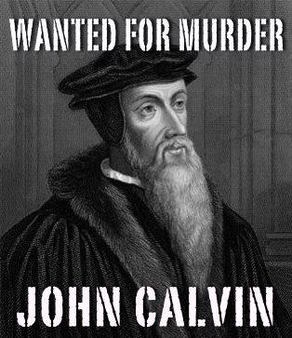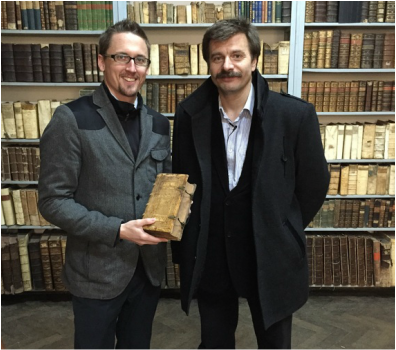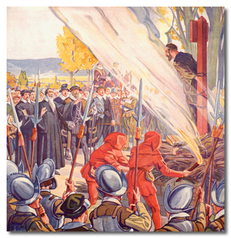
How so? Calvin did not believe all Old Covenant laws had been set aside by the New Covenant Jesus inaugurated. He didn't buy into the plain sense of Hebrews: “God has made the first covenant obsolete” (Hebrews 8:13). He maneuvered around Paul’s conclusion: “the Law became a tutor to lead us to Christ and now that faith has come we are no longer under a tutor” (Galatians 3:24-25; cf. Rom 10:4). Calvin dismissed this data from the New Testament and decided the moral laws in the Old Covenant laws of the Torah still applied. And killing people who perverted his pure doctrine was a moral necessity.
Calvin specifically justified capital punishment of heretics with Leviticus 24:16. “The one who blasphemes the name of the Lord should be put to death; all the congregation must stone him. Any foreigner or native who blasphemes the Name should be put to death.”
Jesus’ teaching to “love your enemies” didn’t stop Calvin from approving and promoting the death of his theological enemies. And Paul’s instructions for dealing with people who theologically disagree with you were equally ignored: “A servant of the Lord must not quarrel but must be kind to everyone, be able to teach, and be patient with difficult people. Gently instruct those who oppose the truth. Perhaps God will change those people’s hearts, and they will learn the truth” (2 Timothy 2:24-25). Calvin did not patiently discuss his differences with people who promoted competing ideas. Calvin requested beheadings, made death threats, and praised God for orchestrating the torture of heretics.
Calvin spelled out his theologically reinforced vengeance in a personal letter:
“I am persuaded that it is not without the special will of God that, apart from any verdict of the judges, the criminals have endured protracted torment at the hands of the executioner.” - Calvin's letter to Farel on 24 July (for more words directly from Calvin’s pen, read Selected Works of John Calvin)
Personal correspondence and city council records betray John Calvin’s extraordinary influence in Geneva. Although he was asked to leave in 1538 when he enforced his strict moral standards and pushed for the church’s independent power to excommunicate people, Genevan officials invited him to return in 1541 to resolve church divisions. Upon his return, the city council approved his Ecclesiastical Ordinances that included the establishment of the Consistory. The Consistory, a church court that oversaw the discipline of the citizens of Geneva, met every Thursday to review cases (This book is a chronicle of the Consistory’s records from 1542-1544.) John Calvin led the court. Although the Consistory did not have the power to imprison, exile, or kill those who were guilty, Calvin could still convince the city magistrates to wield such power when his theological opponents contradicted him.
When Jacques Gruet, a theologian with differing views, placed a letter in Calvin’s pulpit calling him a hypocrite, he was arrested, tortured for a month and beheaded on July 26, 1547. Gruet's own theological book was later found and burned along with his house while his wife was thrown out into the street to watch.
Michael Servetus, a Spaniard, physician, scientist and Bible scholar, suffered a worse fate. He was Calvin's longtime acquaintance who resisted the authority of the Roman Catholic Church. However, he angered Calvin by returning a copy of Calvin's Institutes with critical comments in the margins. So what did Calvin do? You can read his resolution from a personal letter he wrote to a friend:
“Servetus offers to come hither, if it be agreeable to me. But I am unwilling to pledge my word for his safety, for if he shall come, I shall never permit him to depart alive, provided my authority be of any avail.” - Letter to Farel, 13 February 1546
 Dr. Paul Penley (left) holding a 1575 print of Calvin's Institutes at a Seminary library in Cluj, Romania. Thanks Istvan!
Dr. Paul Penley (left) holding a 1575 print of Calvin's Institutes at a Seminary library in Cluj, Romania. Thanks Istvan! “Servetus . . . suffered the penalty due to his heresies, but was it by my will? Certainly his arrogance destroyed him not less than his impiety. And what crime was it of mine if our Council, at my exhortation, indeed, but in conformity with the opinion of several Churches, took vengeance on his execrable blasphemies?” - Calvin
John Calvin argued:
“Whoever shall now contend that it is unjust to put heretics and blasphemers to death, knowingly and willingly incur their guilt. It is not human authority that speaks, it is God who speaks and prescribes a perpetual rule for His Church.”
That’s why I design and teach Hermeneutics courses. I don’t want culture to contort the way I compel people to follow Jesus. I want the Bible to shape my values and not the other way around. If you want to learn how to interpret the Bible more accurately, you can download my Bible Interpretation workbook and start watching this free online video Hermeneutics course.







 RSS Feed
RSS Feed
